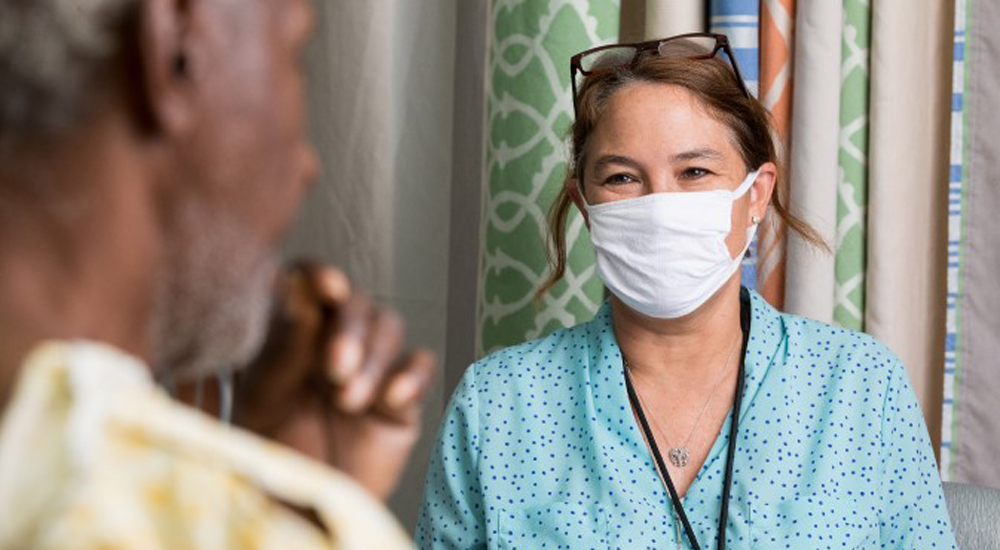Colorectal cancer (CRC) is one of the most diagnosed cancers within VA at nearly 4,000 diagnoses per year. It’s the second leading cause of cancer death for both men and women in the United States.
Lynch Syndrome testing can help identify a patient’s genetic predisposition for CRC, which can in turn help family members understand if they may be at risk.
What is Lynch Syndrome?
Lynch syndrome is a collection of genetic mutations that can indicate an increased risk for colorectal cancer. The lifetime risk of colorectal cancer in people with this signature can range from about 10% to about 80%, depending on which gene mutation is causing the syndrome.
People with Lynch Syndrome are also at increased risk for some other cancers, such as cancers of the uterus (endometrium), ovaries, stomach, small bowel, pancreas, kidneys, brain, ureters (tubes that carry urine from the kidneys to the bladder), and bile ducts.
Expansion of National Precision Oncology program
Through the National Precision Oncology Program (NPOP) and the National Pathology and Laboratory Medicine Program (PLM), the National Oncology Program is excited to announce the expansion of Lynch Syndrome testing for those recently diagnosed with Colorectal Cancer to 131 sites across the country.
 Additionally, NPOP and PLM are planning molecular testing support for VA facilities with limited capacity, with two additional main testing sites within the next calendar year. This effort will result in the increased capacity to test up to 1,300 Veterans per year.
Additionally, NPOP and PLM are planning molecular testing support for VA facilities with limited capacity, with two additional main testing sites within the next calendar year. This effort will result in the increased capacity to test up to 1,300 Veterans per year.
NPOP works with PLM to ensure that all Veterans have access to cutting edge molecular testing, which will help their doctors decide the best treatments for their cancer.
In recent years, NPOP has expanded geographically and in scope to all eligible VA facilities, where 28,000 samples have been successfully tested.
More than 22,000 Veterans with cancer, including 7,100 with a rare cancer, have had their care guided by advanced molecular testing. NPOP, founded out of the first Cancer Moonshot effort in 2016, provides testing of different cancers that have expanded to include:
- Lung cancers
- Metastatic prostate cancer
- All pancreatic cancers
- Advanced cholangiocarcinoma
- Advanced bladder cancer
- Other advanced solid tumors and rare cancers.
VA encourages colorectal cancer screening
Regular colorectal cancer screenings are key to staying on top of your health and may decrease your risk of dying from colorectal cancer by upwards of 68%.
In addition to Lynch Syndrome testing, VA offers multiple screening options for Veterans, including home-based screening with a fecal immunochemical test that checks for blood in stool, traditional colonoscopies and flexible sigmoidoscopies.
VA performs nearly 300,000 colonoscopies each year. Research has demonstrated the quality of these colonoscopies is very high and exceeds established national quality benchmarks.
Contributing to the goals of Cancer Moonshot
More than 43,000 Veterans are diagnosed with cancer each year and millions are considered at risk. By deploying innovative technologies like AI to improve outcomes, VA contributes to the goals of Cancer Moonshot, which aims to reduce the cancer death rate by half within 25 years.
For frequently asked questions about the National Oncology Program, visit cancer.va.gov/CANCER/faq.asp. To learn more about cancer care at VA, visit cancer.va.gov or email cancer@va.gov. To learn more about colorectal cancer screening, visit the U.S. Preventative Task Force website.
Visit My HealtheVet to learn tips and tools to help you partner with your VA health care team.
Topics in this story
Link Disclaimer
This page includes links to other websites outside our control and jurisdiction. VA is not responsible for the privacy practices or the content of non-VA Web sites. We encourage you to review the privacy policy or terms and conditions of those sites to fully understand what information is collected and how it is used.
More Stories
Study underscores important role COVID vaccination can have in protecting Veterans from infection and reducing long-term health consequences
Columbia VA’s robotic surgery teams completed their 800th robotic surgery and are on schedule to hit 1,000 by the end of the year.
In a decentralized clinical trial, Veterans can participate from their own homes or local VA instead of having to travel to a research site.







I wish this article did more to articulate those who ‘need’ (and qualify for) this genetic testing PRIOR to developing or being diagnosed with ‘cancer’. My colonoscopy results have indicated the presence of ‘polyps’ described as ‘pre-cancerous’. Does this indicate a ‘need’ for this genetic testing? Would I benefit or qualify for this testing? Does a ‘postitive’ test result showing a presence of these genetic markers indicate a regimen of treatment options?
Hi Michael,
Sharing a couple of websites with you that might provide you with a little more clarification:
1. Fight CRC – https://fightcolorectalcancer.org/about-colorectal-cancer/general-information/genetics/
2. FORCE (Facing Our Risk of Cancer Empowered) – https://www.facingourrisk.org/portal/people-with-lynch-syndrome
I hope this information is helpful and it’s great to see that you are proactive in understanding your healthcare choices.
Michael-I had never heard of Lynch Syndrome until I read this article. My father and his mother both died of Colon Cancer(Prostate cancer was also a contributing factor with my father). I have been screened since I turned 40 (for 30 years). Some were 5 year intervals and some were 2 year intervals. When they find the “Bad” polyps, I go to every two years. No polyps or “Good” polyps-I stay at or go to five year intervals. I have always been told it is hereditary. (I have also had prostate and skin cancer and ulcers). I am going to ask about it, at my next VA appointment, next month. At this stage of my life, it will not do me any good. But, it may help my son and grandson. I don’t know if I had had this screening in my early years.
Every Dr I have had(Mil/Civilian/VA) has pushed hard for me to get screened-because of my family history. Hope this helps.
As a 3x Cancer Survivor, diagnosed with Lynch Syndrome, I truly appreciate the VA putting this information out to the public. As a Navy Veteran, I wish I could have had this information years ago. I’ve also become a Patient Advocate surrounding this subject cancer, Lynch Syndrome and genetic testing and encourage individuals to also review the website for FORCE (Facing Our Risk of Cancer Empowered) – https://www.facingourrisk.org/
There is a lot of great information here to help you live a more educated life about Lynch Syndrome and preventive measures with this disease.
Thank you for your service to the country. Best wishes, Dr. Wang-Rodriguez
I have had severe digestive issues most of my adult life. Well, since returning from Nam. I have had many colonoscopies as well with many polyps with some cancer or pre cancer. I have had colitis and diverticulitis a couple of times and was hospitalized. I have hemorrhoids as well and Prostate cancer. I just had a biopsy earlier this month and the prostate cancer has not spread to the tested areas. Many other severe health issues but too many to list. What should I do? Have this special test? Thanks Ron Savage. 1-31-2031 5:46 pm
Please discuss your testing options with your provider. Thank you for your service to the country. Best wishes to your health.